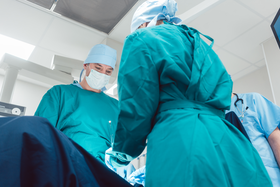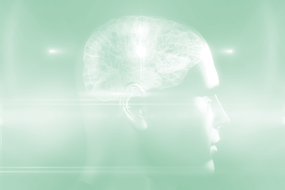 When we think of concussions and brain injuries we tend to associate those with men, after all, they’re the ones playing football and predominantly in combat. But studies show both female athletes and women in general suffer a higher rate of concussions than men. Female brain injuries also tend to be more severe and require longer recovery. In fact, a recent study revealed that when it comes to high school athletes, female soccer players outrank male football players in incidences of traumatic brain injury. Almost 30 percent of injuries sustained by female players are brain injuries, whereas male football players have a much lower rate of brain injury at 24 percent. High school female athletes with concussions also reported more problems with sound and light sensitivity, nausea, dizziness, and drowsiness and took longer to recover. Professional female athletes also have significantly more brain injuries than their male counterparts in every sport except swimming and diving. Why do women have more concussions? Although researchers don’t have definitive answers, looking at the structure of the female neck and head compared to the male can give us insight. The male neck is much stronger, bigger, and better able to handle acceleration than the female neck. When it comes to bone and neck strength, women are at a disadvantage when it comes to impacts, blows, and falls that affect the head and neck. Female hormones and brain injury Scientists have also found that female hormones appear to play a large role in brain injury risk. Female concussion risk and consequences are largely similar to male before puberty and after menopause. However, during the reproductive years, a woman’s menstrual cycle can affect how badly she is affected by a brain injury. For instance, women injured during the last two weeks of their cycle fare worse from a concussion than those injured during the first two weeks. Severity risk also appears to be tied to fluctuations in hormone levels throughout the cycle. The drops in estrogen during ovulation and menstruation trigger migraines in some women and may be periods of increased risk. Misconceptions around gender and concussions compound the problem. Many people still assume girls and women are at less risk for concussion and their symptoms go unreported simply due to lack of awareness. Pink Concussions is an organization dedicated to raising awareness and promoting research on concussions in women and girls. Functional medicine helps you recover from brain injury and concussion more quickly Functional Neurology excels in the field of brain recovery from concussions. In functional neurology we go beyond telling you to rest. A thorough functional neurology exam can pinpoint specific areas of injury to both the brain and the vestibular (inner ear) system. Different areas of the brain and the vestibular system require different rehabilitation strategies — customizing rehab to your areas of compromise will help you recover and improve faster. Plus, we look at functional medicine mechanisms in supporting your brain health. How is your hormone balance, your diet, and your gut health? Do you have chronic inflammation, food sensitivities, autoimmunity, or other unidentified stressors that could be making it harder for your brain to recover? These are important factors to address. You can call us at 317-848-6000 or contact Dr. Ralston directly as drralston@neurohealthservices.com. We offer a 10min consultation to discuss you condition and options to help.  Obviously with the current pandemic of COVID-19, the novel coronavirus, I have been getting a lot of questions from patients regarding optimizing their immune system. So, we have been working with patients to help them understand their immune response and how to improve immune function so that the host, which is us, is less suitable for the COVID-19 virus. As you read in the paper and heard on the news reports, this is a new virus that mutated from animal species to a human virus and it is a new virus, therefore, our body does not have antibodies to this virus as of yet. The virus appears to be highly contagious and virulent to patients who are predisposed to immunocompromised, diabetes, obesity, inflammation, respiratory disorders, particularly targeting those over 60 years old. But for any patient to prevent illness and any one of us trying to ward off the effects of this virus, improving immune function is as important today as in the future. So, understanding your immune system, you basically have two players at hand with the immune system. We have the innate and the adaptive immune response. The innate immune response is basically the immediate immune response that would respond to a virus. The innate immune response is your stomach barriers, skin tissue, and your eosinophils, basophils, lymphocytes that would immediately come in contact with a potential pathogen such as a virus. The innate immune response can be influenced by anything that would stress your body, physical, chemical, psychological stress can all affect your innate immune response. Therefore, during this stressful time, trying to remain calm, trying to do things that are relaxing such as meditation, yoga, exercise, massage, even chiropractic to remove as much stress as possible. In regard to this virus, getting adequate sleep seems to be a definite important factor, especially for autoimmune patients who when their autoimmunity up regulates, their sleep/wake cycles become disrupted and their anxiety increases. Therefore, adequate sleep is probably paramount. And sadly, to say, when this quarantine happened, there is a lot more time to sit around and drink alcohol, but that is probably not a good strategy, trying to mildly to moderately consume alcohol would be a suggestion. Your adaptive immune system is more of your B and T cells. These are activated when the virus is in your body and the immune system is mounting an immune attack on the virus. Therefore, the role of the adaptive immune system is imperative as well. Some strategies we have been using nutritionally to support our patients, both innate and adaptive immune responses are products such as vitamin C. You have probably heard that vitamin C has been used in Shanghai and it has also been used in New York City intravenously. While vitamin C does not kill the virus, it certainly supports the immune system and decreases the effects of the virus on your system. Therefore, vitamin C seems to be a key influencer of the infection, so we are recommending our patients take vitamin C. You can take 1000 mg up to four times a day to bowel tolerance. Probiotics are also important. Probiotics support your gut barriers, as we talked about with the innate immune system. Taking probiotics is a key influencer of the immune system and, therefore, that is a good thing to add as well. Zinc, making sure your zinc levels are adequate is another important strategy. Optimum levels of Vitamin D are also important. Several studies have shown that low levels of Vitamin D make pt.’s susceptible to Covid. In my practice it is common to find pt.’s with low vitamin D levels especially bc of the long winters we have. Therefore, optimum levels of vitamin D are important now and moving forward. You can easily have your levels checked by your doctor; we are happy to provide this. Most pt.’s need on average 3-5K iu/day of vitamin daily just to maintain their levels through the winter. Specifically, in talking about COVID-19, it seems the pathological process is the cytokine storm that happens in the lung that creates significant breathing problems in patients who contract the virus. There are some studies that show that glutathione, which is an immune system booster, an antioxidant and an intracellular detoxifier downregulate cytokine load in the lung specifically. Therefore, I have been recommending my patients take Trizomal Glutathione, which is a product we carry. In addition, resveratrol, which is an antioxidant, has also been shown to be helpful with the effects of the virus, as well as some other Chinese herbs. Another important aspect in this managing stress. The fear and anxiety of this pandemic has been very high on some pt.’s. This stress response puts your body in fight or fight mode. As a result, cortisol, your stress hormone is increased. Cortisol weakens your immunes system, therefore managing stress is an important part of building your immunes system up. I use adrenal adaptogens to help manage cortisol and stress. Ashwagandha, Rhodiola are just a few of the compounds that I find helpful. If you find yourself really stressed, reach out to a provider for assistance. Therefore, in conclusion, if you should have any further questions about specific supplement strategies, you can feel free to contact my office at 317-848-6000. I think moving forward from this pandemic, one of the benefits may be an awakening of our need to prioritize our health and our immune system to make us as healthy and strong as possible. Monitoring your CBC, monitoring your white blood cell count and the factors of your immune system may be things that prove to be beneficial in the future rather than just looking at acute illness, looking at immune health on an ongoing basis. I hope everybody stays healthy. Sincerely, Dr. Ralston  The study’s authors remind us that nothing in the body acts in isolation, something we’ve long known in functional medicine and functional neurology. Understanding some brain basics helps you understand symptoms when your brain isn’t working right. The brain is our heaviest and most complex organ, using most of the body’s oxygen and about 30 percent of its energy supply. The brain is divided into sections, each in charge of different functions although all working together. In functional neurology, we can identify areas of poor brain function and help you get them working better again with customized therapy and rehabilitation. Frontal Lobe The frontal lobe is the area of your forehead that stretches between the temples. The human frontal lobe distinguishes us from other animals and governs much of our personality, impulse control, and the ability to reason. A frontal lobe injury can completely change your personality and ADHD is understood to affect the frontal lobe. The frontal lobe also governs emotional drive, motivation, and planning. Poor frontal lobe function can result in an inability to set goals or follow through on projects or plans. You may feel lazy, unmotivated, or depressed if so. In fact, depression is simply a frontal lobe impairment. The frontal lobe activates the muscles. Poor frontal lobe function can result in moving more slowly or not swinging your arms when you walk. Fine-motor coordination also falls under the frontal lobe’s duties. This is needed for handwriting, embroidery, and other detailed movements of the hands. As the frontal lobe degenerates it’s typical for handwriting to worsen. Symptoms and signs of possible frontal lobe impairment
Temporal Lobe The temporal lobes are located on either side of the brain above the ears. They govern hearing, speech, memory, emotions, and distinguishing smells. Tinnitus (ringing in the ear) is a common symptom of temporal lobe dysfunction, although not all tinnitus is due to temporal lobe degeneration, as is difficulty distinguishing between different tones. Within the temporal lobes is the hippocampus, the seat of learning and memory. Degeneration of the hippocampus leads to poor memory and eventually Alzheimer’s disease. It is also involved with spatial orientation, sense of direction, and circadian rhythm (sleep-wake cycle). Symptoms and signs of possible temporal lobe impairment
Parietal Lobe The parietal lobes are located behind the ears and perceive and interpret sensations such as touch, pressure, texture, weight, size, or shape. The parietal lobe function also tells the body where it is in its environment. Reoccurring injuries are common with parietal lobe impairment. Symptoms and signs of possible parietal lobe impairment
Cerebellum Your cerebellum is two lobes at the back of the head, directly above your neck. It calibrates muscle coordination and balance and filters information before sending it to the brain. Symptoms and signs of possible cerebellum impairment
Occipital Lobe The occipital lobe is in the back of the brain and processes visual information. Symptoms of possible occipital lobe impairment
Any of the above symptoms in adults usually mean degeneration in those areas of the brain while in children it can signal poor brain development. If your overall brain function is declining, you may have many of these symptoms.
The good news is the brain is very receptive to improving with the right nutrients and input. Functional neurology excels in identifying areas of brain dysfunction and customizing brain rehabilitation specifically for your brain. Ask my office for more information on a 10 min diagnostic exam to evaluate your brain function for only $69.00. You can contact our office at 317-848-6000 or contact Dr. Ralston directly at drralston@neurohealthservices.com. |
NeuroHealth Services
|
Our Doctors |
Learn More |
|
|

 RSS Feed
RSS Feed
